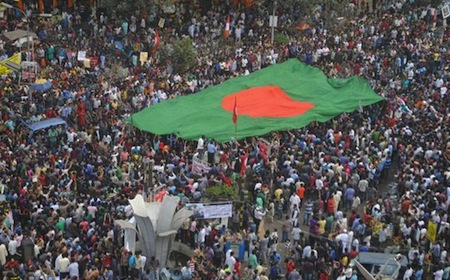For the past 17 days, while most of the United States and Europe has ignored it, Bangladesh has undergone perhaps the most important political mobilization since its independence in 1971 — a series of protests that have become known as the Shahbagh protest, named after a central intersection and neighborhood in Dhaka, the Bangladeshi capital where protestors have gathered. Even though Pakistan is preparing for elections later this spring and India is already moving toward campaign season for the 2014 elections, it’s becoming clear that Shahbagh is the most important political event in South Asia so far in 2013.![]()
A good friend, Rashad Ullah, wrote a thoughtful guest piece on the protests nearly two weeks ago when they were in their infancy — a piece that attracted some of Suffragio‘s highest readership over the past year, in fact, and which explained the background of the protest. The protest followed immediately upon the life imprisonment sentence for Abdul Quader Mollah by a special war crimes panel, the International Crimes Tribunal, established by the current government of prime minister Sheikh Hasina (pictured below).
Quader Mollah is the leader of the Jamaat-e-Islami (বাংলাদেশ জামায়াতে ইসলামী), the country’s largest Islamist party, and the protestors are now generally calling for a ban on Jamaat-e-Islami in the furtherance of a fully secular political space in Bangladesh, and there’s some evidence that the Bangladeshi government may accede to the demands.
As it turns out, the life sentence was lighter than most Bangladeshis expected.
If you’re a relative moderate in the ‘West’ — meaning, the United States and Europe — you likely oppose the death penalty, so when you see the Shahbagh protest, you’ll see two different aspects, the first being a movement devoted to the execution of Quader Mollah and other war criminals, angry youths wielding placards bearing nooses and slogans of vengeance.
But that’s not the entire picture — and as the protests continue and grow (now in their 17th day), they seem to be taking on a more transcendental quality.
Over the past two weeks, I’ve re-learned anew the horror of the crimes that Pakistan’s army and its supporters perpetrated within East Pakistan/Bangladesh in the short but brutal war of independence in 1971 — murder, rape, torture, the targeting of women and the Hindu minority, and the systematic assassination of what would have been the Bangladeshi intellectual and political elite upon Bangladeshi independence, atrocities that some suggest may rise to the level of genocide.
On top of those crimes — the original sin of the creation of the Bangladeshi state — both the Pakistani and Bangladeshi governments swept the most horrific elements of 1971 under the rug. That was perhaps understandable coming from Islamabad, but less so from Dhaka, where you would have expected the victors to prosecute what were clearly crimes against humanity by any international standard.
In the context of the time, however, newly independent Bangladesh and its leaders were interested more in geopolitical recognition than in settling scores, especially given the Cold War alliance between the United States and Pakistan. Bangladesh in the 1970s needed diplomatic allies more than it needed war tribunals or even truth and reconciliation.
That creates an even more vital moral obligation for the United States and other allies to take note now. If that weren’t reason enough, it’s important to remember that Bangladesh, with nearly 153 million citizens, is the eighth most-populous country in the world, and one of the world’s largest Muslim-majority democracies.
So it’s increasingly important to keep in mind the second aspect of the Shahbagh protest, what I believe will become the more enduring aspect of what’s happening at Shahbagh — the political coming-of-age of a new generation of Bangladeshis, the sons and daughters (many of whom weren’t yet born in 1971) of those who fought for independence, who are now pushing to finish the business of 1971 by coming to terms with the horrors of the 1971 atrocities, to settle the lack of accountability in either Pakistan or Bangladesh over the past 42 years for the crimes of 1971, and to create a space for Bangladesh to finally move forward as a nation. Continue reading How the ‘West’ should understand — and why it should pay attention to — Shahbagh


